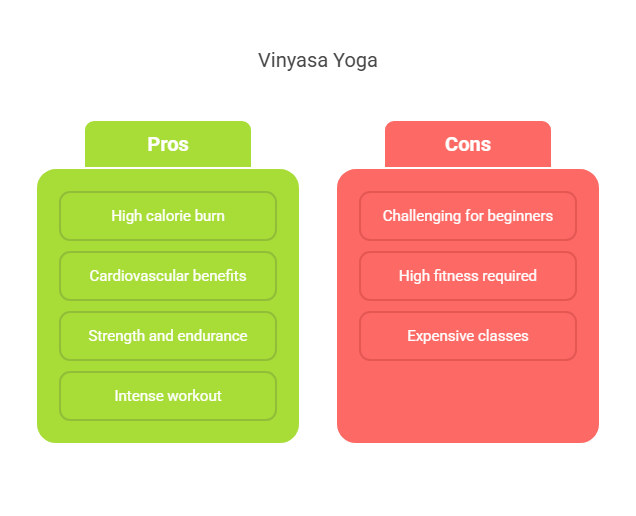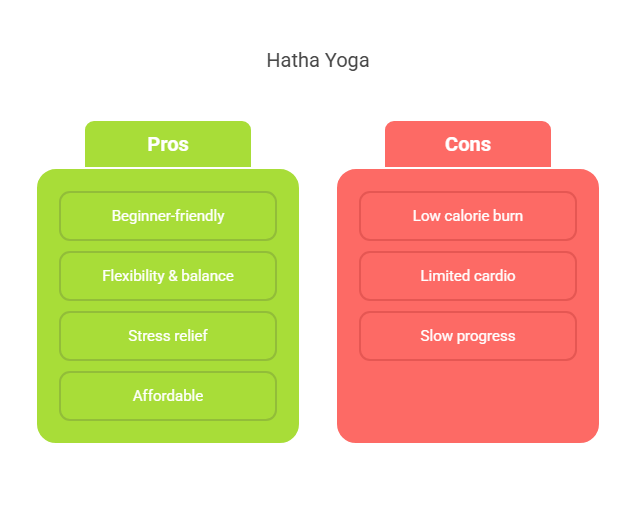
Vinyasa vs Hatha Yoga: Which Burns More Fat?
What You’ll Learn
In this article, we’ll delve into the key differences between Vinyasa and Hatha yoga, focusing on their effectiveness for fat burning and weight loss. By the end, you’ll have a clear understanding of which practice aligns best with your fitness goals.
Quick Comparison Table
| Feature | Vinyasa Yoga | Hatha Yoga |
|---|---|---|
| Pace and Flow | Continuous, rapid transitions between poses creating a dynamic flow. | Slower-paced movements with longer holds in each pose. |
| Calorie Burn and Fat Loss | Approximately 400-500 calories burned per hour. | Approximately 175-250 calories burned per hour. |
| Target Audience | Individuals seeking an intense workout for weight loss and fitness. | Beginners or those preferring a relaxed practice for stress relief. |
| Pricing and Accessibility | May be priced higher due to intensity and demand. | Generally more accessible and affordable. |
| Use Cases and Scenarios | Improves cardiovascular health and aids in weight loss. | Enhances flexibility and provides stress relief. |
| Technical Specifications | Requires higher cardiovascular fitness and stamina. | Focuses on balance and flexibility. |
| User Experience and Class Structure | Fast-paced and energetic classes. | Slower-paced classes allowing for deeper relaxation. |
Overview of Vinyasa Yoga

Vinyasa yoga, often referred to as “flow” yoga, involves continuous movement from one pose to another, creating a dynamic and vigorous practice. This style is known for its cardiovascular benefits and calorie-burning potential.
Pros
– High calorie burn: Approximately 400-500 calories per hour. ([pointovu.com](https://pointovu.com/calories-burned-in-a-typical-yoga-session-explained/?utm_source=openai))
– Improves cardiovascular health.
– Enhances strength and endurance.
– Suitable for individuals seeking an intense workout.
Cons
– May be challenging for beginners.
– Requires a higher level of fitness and stamina.
– Classes can be more expensive due to demand.
Overview of Hatha Yoga

Hatha yoga is a slower-paced practice that focuses on holding poses for longer periods, emphasizing balance, flexibility, and relaxation. It’s often recommended for beginners or those seeking a gentler approach to yoga.
Pros
– Accessible to beginners.
– Enhances flexibility and balance.
– Provides stress relief and relaxation.
– Generally more affordable and widely available.
Cons
– Lower calorie burn compared to more intense styles.
– May not provide the same cardiovascular benefits as Vinyasa.
– Progress can be slower for those seeking rapid fitness improvements.
Side-by-Side Breakdown
Pace and Flow
Vinyasa yoga is characterized by continuous, rapid transitions between poses, creating a dynamic flow that keeps the heart rate elevated. In contrast, Hatha yoga features slower-paced movements with longer holds in each pose, allowing for deeper stretching and relaxation.
Calorie Burn and Fat Loss
Vinyasa yoga can burn approximately 400-500 calories per hour, making it effective for weight loss and improving cardiovascular health. ([pointovu.com](https://pointovu.com/calories-burned-in-a-typical-yoga-session-explained/?utm_source=openai)) Hatha yoga, on the other hand, burns about 175-250 calories per hour, offering a gentler approach to calorie expenditure. ([yogahelp.org](https://yogahelp.org/how-many-calories-do-you-burn-doing-yoga/?utm_source=openai))
Target Audience
Vinyasa yoga is suited for individuals seeking an intense workout that combines cardiovascular exercise with strength training, ideal for those aiming for weight loss and improved fitness levels. ([livestrong.com](https://www.livestrong.com/article/555768-vinyasa-yoga-vs-traditional-cardio-for-weight-loss/?utm_source=openai)) Hatha yoga is best for beginners or individuals preferring a slower-paced, gentle practice focused on foundational poses, flexibility, and relaxation, making it suitable for stress reduction and building a solid yoga foundation. ([apnews.com](https://apnews.com/article/b90dbaa494e7f7ec9e864b066670f7f0?utm_source=openai))
Pricing and Accessibility
Both Vinyasa and Hatha yoga classes are widely available, but class prices may vary. Vinyasa classes might be priced higher due to their intensity and demand, while Hatha classes are generally more accessible and affordable.
Use Cases and Scenarios
Vinyasa yoga is beneficial for those aiming to improve cardiovascular health, burn calories, and engage in a high-intensity workout. ([livestrong.com](https://www.livestrong.com/article/555768-vinyasa-yoga-vs-traditional-cardio-for-weight-loss/?utm_source=openai)) Hatha yoga is suitable for stress relief, enhancing flexibility, and providing a gentle introduction to yoga for beginners. ([apnews.com](https://apnews.com/article/b90dbaa494e7f7ec9e864b066670f7f0?utm_source=openai))
Technical Specifications
Vinyasa yoga requires a higher level of cardiovascular fitness and stamina due to its fast-paced nature. ([livestrong.com](https://www.livestrong.com/article/555768-vinyasa-yoga-vs-traditional-cardio-for-weight-loss/?utm_source=openai)) Hatha yoga focuses on balance and flexibility, making it more accessible for individuals with varying fitness levels. ([apnews.com](https://apnews.com/article/b90dbaa494e7f7ec9e864b066670f7f0?utm_source=openai))
User Experience and Class Structure
Vinyasa classes are fast-paced and energetic, often set to music, creating an engaging and motivating environment. ([livestrong.com](https://www.livestrong.com/article/555768-vinyasa-yoga-vs-traditional-cardio-for-weight-loss/?utm_source=openai)) Hatha classes are slower-paced, allowing for deeper relaxation and mindfulness, with a focus on proper alignment and breathing techniques. ([apnews.com](https://apnews.com/article/b90dbaa494e7f7ec9e864b066670f7f0?utm_source=openai))
Which One Should You Choose?

Your choice between Vinyasa and Hatha yoga should align with your personal fitness goals and preferences:
– **Vinyasa Yoga**: Ideal for individuals seeking a dynamic, high-intensity workout that combines cardiovascular exercise with strength training, suitable for those aiming for weight loss and improved fitness levels.
– **Hatha Yoga**: Best for beginners or individuals preferring a slower-paced, gentle practice focused on foundational poses, flexibility, and relaxation, making it suitable for stress reduction and building a solid yoga foundation.
Vinyasa vs Hatha Yoga: The Final Verdict
| Category | Vinyasa Yoga | Hatha Yoga |
|——————————|————–|————|
| Best for Beginners | No | Yes |
| Best for Power Users | Yes | No |
| Best Value | Depends | Depends |
Findings and Recap
In summary, Vinyasa yoga offers a more intense, calorie-burning workout suitable for those aiming for weight loss and improved cardiovascular health. Hatha yoga provides a gentler approach, focusing on flexibility, balance, and relaxation, making it ideal for beginners or those seeking stress relief.
Related reading: Exploring the Benefits of Different Yoga Styles
AI Image Prompt: A split-screen image showing a dynamic Vinyasa yoga class on one side and a serene Hatha yoga session on the other, highlighting the contrast between the two styles.
“`html
Frequently Asked Questions
What is the main difference between Vinyasa and Hatha yoga?
Vinyasa yoga is a dynamic practice that links breath with continuous movement, creating a flowing sequence of poses. In contrast, Hatha yoga is slower-paced, focusing on holding poses for longer durations to build strength and flexibility. ([webmd.com](https://www.webmd.com/balance/difference-between-hatha-and-vinyasa-yoga?utm_source=openai))
Which style is more suitable for beginners?
Hatha yoga is generally more accessible for beginners due to its slower pace and emphasis on foundational postures. Vinyasa yoga’s faster transitions may be challenging for those new to yoga. ([webmd.com](https://www.webmd.com/balance/difference-between-hatha-and-vinyasa-yoga?utm_source=openai))
Can Vinyasa yoga provide a cardiovascular workout?
Yes, Vinyasa yoga’s continuous movement and flowing sequences can elevate the heart rate, offering a cardiovascular workout that also builds strength and endurance. ([meditatemotion.com](https://meditatemotion.com/blog/difference-between-hatha-yoga-and-vinyasa/?utm_source=openai))
Is Hatha yoga effective for stress reduction?
Yes, Hatha yoga’s slower pace and focus on breathwork and meditation can help reduce stress and promote relaxation. ([healthline.com](https://www.healthline.com/health/exercise-fitness/hatha-vs-vinyasa?utm_source=openai))
How do the breathing techniques differ between Vinyasa and Hatha yoga?
In Vinyasa yoga, breath is synchronized with movement, creating a continuous flow. Hatha yoga emphasizes deep, deliberate breathing to enhance relaxation and mindfulness. ([lotusonmain.com](https://lotusonmain.com/hatha-vs-vinyasa-yoga-choosing-the-right-style/?utm_source=openai))
Which style is better for improving flexibility?
Both styles can improve flexibility, but Hatha yoga’s slower pace allows for deeper stretches and longer holds, which may be more effective for increasing flexibility. ([healthline.com](https://www.healthline.com/health/exercise-fitness/hatha-vs-vinyasa?utm_source=openai))
Can I practice both Vinyasa and Hatha yoga?
Yes, incorporating both styles into your routine can provide a balanced approach, combining the dynamic flow of Vinyasa with the grounding and restorative aspects of Hatha. ([yogaandmoreschool.com](https://www.yogaandmoreschool.com/blogs/yoga-styles/difference-between-hatha-vinyasa?utm_source=openai))
“`